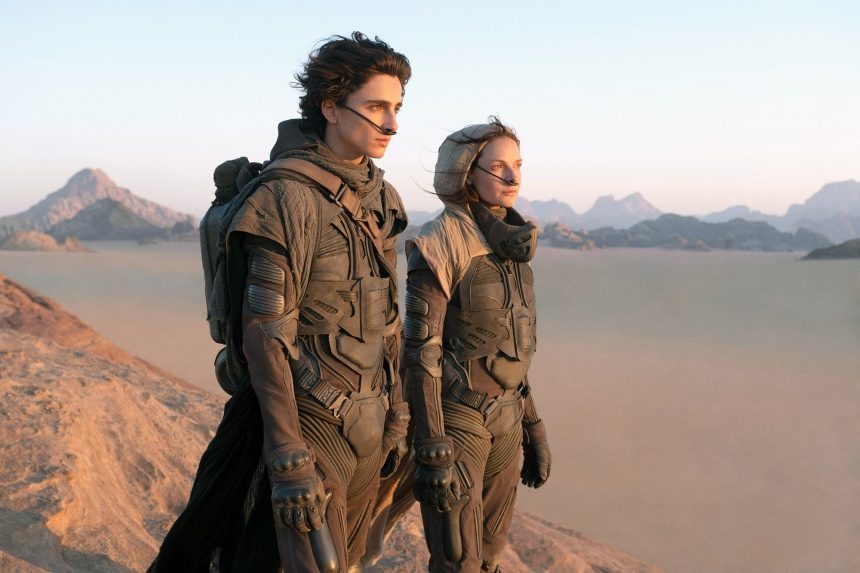Dune
⭐⭐⭐
Rating: PG-13
Run Time: 2 hours 35 minutes
Stars: Timothée Chalamet, Oscar Isaac, Rebecca Ferguson
Writers: Jon Spaihts, Denis Villeneuve, Eric Roth
Director: Denis Villeneuve
Reviewed at the Toronto International Film Festival
There are two ways to look at Dune, cowriter/director Denis Villeneuve’s new take on Frank Herbert’s classic (and encyclopedic) 1965 novel about a mystical sand-bound planet, its enslaved people, and the unexpected messiah who arrives to set them free.
One: You can moan about how the filmmaker’s vision failed to capture the layered mythology and baroque narrative of Herbert’s 900-page novel.
Two: You can sit back and let a masterful cinematic storyteller do his thing. Think of the film as a jazz riff on an original melody, with the artist hitting notes the composer never dreamed of and, inevitably, skipping many of the more familiar ones. That won’t guarantee you’ll like the movie, but at least you’ll be acknowledging the legitimacy of another person’s viewpoint.
It’s a binary choice that can also be applied to David Lynch’s 1984 version of Dune — largely reviled by fans of the book and dismissed as visually brilliant but narratively unintelligible — and the relatively well-received 2000 three-part TV miniseries, which took advantage of its extended run time to delve into the novel’s more arcane elements.
As a movie and TV series, Dune has always defied concise description, and that alone makes it a pretty tough sell for anyone who hasn’t read the books. Here goes my elevator pitch: There’s just one planet in the entire universe — Dune — that is naturally stocked with a powerful spice that enables people to bend time and space. So whoever controls the spice controls the cosmos. For all of history, power-hungry empires have battled over this stuff, fighting with the planet’s primitive yet combative native inhabitants, known as Fremen.
Now, the regional emperor has charged an unusually virtuous leader, Duke Leto Atreides (bearded Oscar Isaac, aging gracefully), with serving as caretaker of Dune. He sets up shop in one of Dune’s fortified cities, bringing along Lady Jessica (raven-haired Rebecca Ferguson, Tom Cruise’s Mission: Impossible match) and their son, Paul (wispy Timothée Chalamet, Oscar-nominated for Call Me by Your Name). But there are traitorous forces at work, and before long Paul — the possessor of supernatural powers of intuition and combat — finds himself trudging across the rippling wastelands of Dune, battling the forces of galactic evil.
If right about now you’re saying, “Gee, this sounds a lot like Star Wars with a side order of Lord of the Rings,” then I’ve done my job. For while Herbert’s Paul Atreides predates George Lucas’s Luke Skywalker by a decade or so, it was Star Wars that forged the template for movie space fantasies to come.
There is much to appreciate in the version of Dune offered by Villeneuve, a director whose earlier films have offered striking visions of the future (Blade Runner 2049), the Middle East (Incendies), America’s tumultuous southern border (Sicario) and even the time-space continuum (Arrival). With the Jordanian desert standing in for the planet Dune, Villeneuve builds a stark, threatening world of broiling sun and endless expanses. It’s clearly a deadly home address — and that’s even before we meet Dune’s giant sand worms, which plow underground before breeching the surface, like enormous land sharks, to swallow entire spice-mining camps.
Villeneuve’s brutalist, otherworldly cities and fortresses lack the ornate quirkiness of David Lynch’s steampunk fantasy, but their utilitarian vibe is, perhaps, more what you’d expect to find on an interstellar outpost.
The narrative of Villeneuve’s Dune covers less than half of the sandy landscape Lynch’s film did — the rest of the story will be covered in the planned sequels. In an age of multipart TV series, that’s to be expected, I suppose. Still, it seems to me part of the art of filmmaking has always been to tell a story in roughly two hours, give or take.
One problem with film trilogies is that, unless a story is structured in three distinct thematic chapters — like Coppola’s Godfather films — there’s a sense of someone simply turning out the lights at random points. Part one of Villeneuve’s version doesn’t end at any particularly appropriate spot; you sense the director suddenly standing up, clapping his hands together and saying “Well, that’s enough for now. Off to bed with you!”
I might come back to see more of Villeneuve’s imaginative tapestry, but like the Fremen who wander that planet, resisting all newcomers, I’ve little interest in the vagaries of intergalactic politics.
Just bring on the sand worms!
Featured image: Warner Bros.
Become a Saturday Evening Post member and enjoy unlimited access. Subscribe now




Comments
As I’ve been doing with so many recent TV series, I’ll wait for the end of the story to be shown and then watch the first two. There are too many shows that leave the audience hanging. But, this one does sound interesting.
I liked the book and the Lynch version as well but haven’t taken the time to see the recent serial.